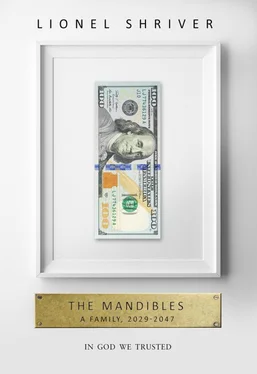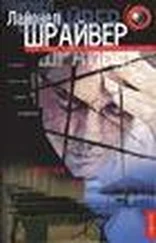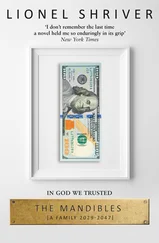To pass the time, Nollie regaled them with reports from her friends in France, who said Americans’ reputation abroad was looking up. The arrogant, loud, gauche, boastful stereotype was obsolete. The few of their compatriots who ventured to Europe were widely regarded as modest, deferent, deflective. They were increasingly renowned for a sly acidity, dry self-deprecation, and black humor. No one tossed off clichés about Americans having “no sense of irony” when their entire country had become an irony writ large. And Yanks told great stories. In Paris, it had grown fashionable to invite lively American raconteurs to dinner parties, much as one might previously have invited the Irish.
Yet as the Myourea sped through Indiana and Illinois, the landscape was blighted on either side with huge, warehouse-style manufacturing plants. These would be abundantly automated and 100 percent foreign-owned. Locals were glad for the few low-level jobs that real people who would work for peanuts could do so cheaply that it wasn’t worth the capital expense of buying and tooling up robs. The US had become a popular location for foreign investment: the land was ample and economical. If income taxes were fiendish, DC was desperate to raise the employment rate, and corporate tax rates were trifling. Undereducated, true, the workforce was also cowed, biddable, and grateful. A higher than average incidence of workplace shootings was unfortunate, but Americans mostly killed each other, and the casualties were easily replaced. Willing had recently heard from their old tenant Kurt, who after Jarred went dark had ended up in one of these sprawling, single-story factories in the Midwest. Kurt said employees slept in dormitories—more like mausoleums than the kind that housed college students. By day, you could walk for half a mile along the shop floor without coming across another human being. It was lonely work, which Kurt said was worse than the boredom.
Their progress moderately impaired by Nollie’s insistence mornings on doing her jumping jacks , they struck Iowa on the third day. Fields of corn stretched to the horizon, rarely interrupted by a farmhouse. The region had always been the country’s breadbasket. Now it was the rest of the world’s. The harvest also mechanized, nearly all this grain was for export. Two years ago, the global population had crossed the ten billion mark earlier than expected. Disappearing for decades, family farms like Citadel had now been swallowed altogether by single concerns with holdings so extensive that they could have become independent countries. Companies from China and India had colonized American agriculture with a sense of entitlement and no small hint of self-righteousness. Feeding ten billion was supposedly a great achievement. Presumably feeding 10.5 billion in three or four years’ time would be an even greater achievement. Willing couldn’t see the satisfaction himself. Maybe they’d even succeed in feeding twelve billion, but then what did you have—that you didn’t have before? He’d rather build an interstate.
Throughout, the housing stock was a disconcerting patchwork. Disheveled clapboards with blistered paint and broken porch railings sat side-by-side glassy, impeccably kept retirement communities with tennis courts and pools. But plenty of smaller outposts along this route were ghost towns. He wondered where everyone had gone.
It was on the fourth day, in Nebraska. At their motel on the outskirts of Omaha that morning, they’d forgotten to fill up the water bottles. Nollie declared she was parched. (She could have been closer to insane, or hypnotized anyway. Between Lincoln and Grand Island, I-80 was so straight you could have used the roadway for a ruler, the land so flat you could have used the prairie for an ironing board. Mr. Expert in the backseat verified that the route didn’t vary in its relentless, perfectly western direction by more than a few yards for seventy-two miles. For once Willing and Goog agreed on something: Nollie’s refusal to put the Myourea into automatic along this mind-numbingly monotonous passage was yunk.) She pulled off onto an unlabeled side road that soon gave way to dirt.
“No way you’re going to find a minimart here,” Goog said. “Turn around.”
She might have, had Goog not opened his big mouth. Nollie never took directions from their hostage. “Maybe not, but even Nebraska isn’t depopulated. Americans can’t be so far gone that they won’t give a stranger a drink of water.”
The track ended at a low-lying building they almost missed, since it was camouflaged by dust, and banked with windblown sand. A few exposed streaks revealed a surface the dun color of the landscape, as if it were designed to be missed. The hockey-puck structure was round, with a flat top and no windows. The featureless dwelling had only one door, which yawned open.
“Looks deserted,” Goog said. “Let’s go back. This place is weird.”
For Willing, unease battled curiosity, and curiosity won out. He stepped gingerly over the sand-mounded threshold. “Hello!” he called, and there wasn’t even an echo. “Give me my maXfleX,” he told Goog. “It’s dark.”
Willing struggled with the screen for a moment. The old fleX rolled neatly into a flashlight in a trice, but the new and improved conversion was awkward. Even when he got the tube rolled, the beam splayed asymmetrically to the left.
The immediate interior was also full of dirt, with the odd empty vodka bottle on top: they weren’t the first to discover this place. Willing swiveled the beam. It found more dirt, a smooth interior black wall, and a hole in the middle: a spiral staircase, with no direction to go but down. The entrance had once been protected by a hatch cover, which leaned at a dysfunctional tilt. Someone had jimmied it up. A smell rose from the opening—stale and dry, with an undertone of corruption. The impression of desolation was absolute. No one was here.
“What is this, Indiana Jones ?” Goog whined. “We should get out of here.”
“I’m surprised at you,” Willing said. “There might be something down there you could tax.”
“Ha-ha. But I’m not setting foot in that pit with my hands taped.”
Actually, they’d grown pretty casual about the tape. It hadn’t been replaced since the day previous. Goog could probably have twisted free if he’d tried.
“He can stay up here, then. I locked the car,” Nollie assured Willing. “He’s not going anywhere. I want to check this out.”
As he and Nollie cautiously descended the gritty obsidian stairs, Willing glanced enviously at her older fleX. The roll was sweet, the light beam clean. Though the afternoon sun of the Nebraska plains was baking outside, the stairwell was cool. The foul taint in the air grew more intense.
One flight down, Willing swept his fleXpot to the side. It struck, of all things, a dusty treadmill. Behind it, the wall was lined with metal dumbbells of ascending size. A few feet to the right sat a cross-trainer, and next to that a rowing machine. He had no understanding of why anyone would bother to build a gym underground.
“Stop,” he shouted sharply to Nollie behind him, embarrassed by the pound of his chest and the bile that rose in his throat. “If you’re at all squeamish, or easily spooked, you should go back up.”
“You can’t imagine I’m ‘squeamish,’ much less—” She dropped the complaint cold.
Willing’s fleXpot was trained on the stationary bicycle. Rather, on its rider. Slumped over the digital readout as if having set the machine for an overambitious hill climb, the figure was draped in a dusty tracksuit. Skulls always appear to be grinning, though this one had enough leathered skin stuck around the mouth to convey more the grimace of exertion. One of the arms had fallen off.
Читать дальше












